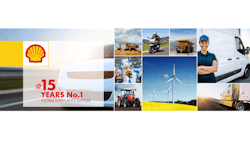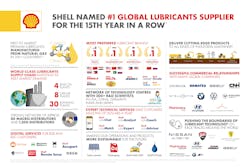Shell leads global lubricants market for 15th year
Shell retains its status as the leading global supplier of finished lubricants for a 15th consecutive year, according to the 19th edition of Kline & Company’s report Global Lubricants: Market Analysis and Assessment 2021.
Using 2020 as the base year, the report covers all leading lubricant consuming country markets, market segments, product types, and formulations. Shell retains the number one ranking for all three lubricants categories tracked by Kline—consumer automotive, commercial automotive, and industrial.
Machteld de Haan, who will take over as Executive Vice President for Shell Lubricants in January, said, “This report confirms Shell as the leading global lubricant supplier across cars, trucks, and industrial equipment for the fifteenth straight year, underscoring the business’s long-standing commitment to customers and reflecting the strength of our superior product portfolio. We have maintained our market-leading position and extended our competitive advantage thanks to our scale, brand equity, technological leadership, and customer relationships, all under the exceptional leadership of Carlos Maurer, our outgoing EVP.”
As the world’s leading lubricants supplier, Shell Lubricants has a critical role to play in supporting Shell's target of becoming a net-zero emissions energy business by 2050, and in helping customers reduce their carbon footprint as well.Earlier this year, Shell launched the largest carbon-neutral program in the lubricants industry, enabling customers in key markets worldwide to choose carbon-neutral1 lubricants across select brands.
Shell aims to offset the annual emissions of more than 200 million liters of advanced synthetic lubricants, expecting to compensate for around 700,000 tons of carbon dioxide equivalent (CO2e)1 emissions per year. This is equivalent to taking approximately 340,000 cars off the road for one year2.
According to this latest report, Shell maintained its leading global market share relative to the year prior with a slight market share increase over the next largest IOC supplier. Shell’s total volume sold was approximately 4,100 kilotons of finished lubricants, equivalent to approximately 4.6 billion liters. These global sales were split almost evenly between the three segments, and at the same percentage split as the previous year: 34% consumer automotive, 36% industrial, and 30% commercial automotive.
Shell has a history of innovation in lubricants and was the first supplier to market cleaner, purer lubricants made from natural gas. As customer needs evolve, Shell is continuing to innovate and has extended its Shell E-Fluids portfolio so that it now supports battery electric (BEV) as well as fuel cell electric (FCEV) powertrains for all passenger and commercial vehicles. In a strategic alliance with Kreisel Electric, Shell also offers a combined battery technology system that delivers industry-leading battery efficiency, fast-charging capabilities, and superior safety and stability.

